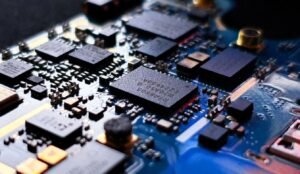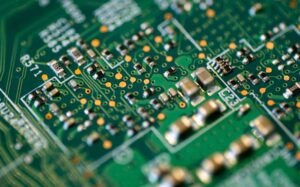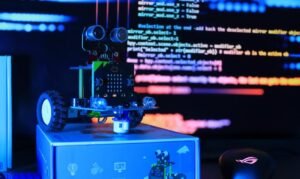AI Applications Examples in Real World
Artificial Intelligence (AI) has seen significant advancements in recent years, and its applications have expanded into various sectors. From healthcare to finance, AI is transforming industries and enhancing the way we live and work. In this article, we will explore some real-world examples of AI applications and how they are revolutionizing different fields.
Key Takeaways:
- AI is transforming multiple industries with its applications.
- Healthcare, finance, and transportation are among the sectors benefiting from AI.
- AI-powered technologies are enhancing decision-making processes and automating tasks.
Healthcare
The healthcare industry has embraced AI technologies to improve diagnostics, personalize treatment plans, and discover new drugs. AI algorithms can analyze medical images like MRI scans and X-rays to detect abnormalities with higher accuracy and speed than human experts. Additionally, AI-powered chatbots and virtual assistants are supporting patients by providing immediate responses and guidance, reducing the burden on healthcare professionals. *The use of AI in healthcare is revolutionizing patient care and leading to better outcomes.*
Finance
The finance sector is leveraging AI for a wide range of applications, such as fraud detection, algorithmic trading, and customer service. AI algorithms can analyze large volumes of financial data in real-time, identifying patterns and anomalies indicative of fraudulent activities. Furthermore, AI-powered chatbots and voice assistants can assist customers in managing their finances, providing instant answers to queries and facilitating transactions. *AI is reshaping finance by automating processes and enhancing financial decision-making.*
Transportation
Autonomous vehicles are one of the most prominent applications of AI in the transportation industry. These vehicles are equipped with sensors and AI systems that enable them to perceive their surroundings and make decisions accordingly, enhancing road safety and reducing accidents. AI algorithms are also used in optimizing traffic flow, analyzing data from cameras and sensors to manage congestion and improve transportation systems. *AI-driven transportation solutions are revolutionizing the way we commute and promoting a more efficient and sustainable future.*
Future Expectations
The potential of AI is immense, and its applications are expected to continue expanding in the future. As technology evolves, we can look forward to witnessing even more sophisticated implementations of AI in various sectors. From personalized medicine to smart cities, AI has the power to revolutionize numerous aspects of our lives, making them more efficient, safe, and convenient. *The future of AI is full of endless possibilities that have yet to be realized.*
| AI Application | Industry |
|---|---|
| Virtual assistants | Multiple industries |
| Automated customer service | Finance, retail |
Table 1: Examples of AI applications in various industries.
AI technologies used in the real world are diverse, spanning across multiple sectors and revolutionizing how we live and operate. Here are some compelling real-world examples of AI applications:
- Predictive analytics – financial institutions use AI algorithms to analyze customer data and predict creditworthiness.
- Recommendation systems – e-commerce platforms leverage AI to suggest products based on user preferences and browsing behavior.
- Medical research – AI is being utilized to analyze genomics data and assist in uncovering new treatments and therapies for diseases.
Conclusion
AI applications are rapidly evolving and transforming multiple industries. From healthcare to finance and transportation, AI is enhancing decision-making processes, automating tasks, and making our lives more convenient. As technology continues to advance, we can expect even more innovative applications of AI in the future. *The possibilities are endless, and AI is undoubtedly revolutionizing the way we live and work.*

Common Misconceptions
Misconception 1: AI is only used by large tech companies
One common misconception around AI applications in the real world is that it is only used by large tech companies. While it is true that companies like Google, Amazon, and Facebook heavily incorporate AI into their products, AI technology is not limited to these companies alone. In fact, AI is now being used across various industries and sectors, including healthcare, finance, manufacturing, and agriculture.
- AI is used in healthcare to analyze medical records and develop treatment plans.
- In finance, AI is used for fraud detection and risk assessment.
- In manufacturing, AI is used to optimize production processes and improve quality control.
Misconception 2: AI will replace human jobs entirely
Another common misconception is that AI will lead to the replacement of human jobs entirely. While it is true that AI has the potential to automate certain repetitive tasks, it is unlikely to completely replace human workers. AI is more commonly used to augment human work, assisting with tasks such as data analysis and decision-making. In many cases, AI is used to enhance productivity and efficiency, rather than replacing human jobs.
- AI can help professionals in fields such as law and finance by analyzing large amounts of data and providing insights.
- In customer service, AI-powered chatbots can handle routine inquiries, freeing up human agents to focus on more complex issues.
- In the transportation sector, AI is used for autonomous vehicles, but humans are still needed for oversight and decision-making.
Misconception 3: AI is all about robots and science fiction
One misconception that many people have is that AI is all about robots and science fiction scenarios. While AI has definitely been popularized in movies and books as humanoid robots with human-like intelligence, the reality is quite different. AI encompasses a wide range of technologies and applications, including machine learning, natural language processing, computer vision, and more. AI is often invisible and integrated into everyday technologies and systems that we use, such as recommendation algorithms, voice assistants, and personalized advertising.
- AI-powered recommendation systems are used by platforms like Netflix and Amazon to suggest products or content based on user preferences.
- Voice assistants like Siri and Alexa use language processing algorithms to understand and respond to user commands.
- Online advertising platforms utilize AI algorithms to serve personalized ads based on user behavior and preferences.

AI Applications in Healthcare
AI technology is revolutionizing the healthcare industry by improving diagnostics, patient care, and drug discovery. The following examples illustrate the wide range of AI applications in healthcare.
| Application | Description |
|---|---|
| Medical Image Analysis | AI algorithms can analyze medical images like X-rays, MRIs, and CT scans, aiding in early detection of diseases and abnormalities. |
| Robot-Assisted Surgery | AI-powered robots assist surgeons in performing delicate surgeries with enhanced precision, reducing human errors and improving patient outcomes. |
| Predictive Analytics | Using patient data and machine learning algorithms, AI can predict disease risks, supporting personalized treatment plans and preventive measures. |
AI Applications in Transportation
The transportation sector benefits greatly from AI, offering solutions for efficient routing, autonomous vehicles, and traffic management. Explore the diverse applications of AI in transportation below.
| Application | Description |
|---|---|
| Self-Driving Cars | AI enables vehicles to navigate roads autonomously, improving safety, reducing accidents, and enhancing overall transportation efficiency. |
| Traffic Flow Optimization | Through real-time data analysis, AI algorithms can optimize traffic flow, mitigate congestion, and minimize travel times. |
| Smart Logistics | AI-powered logistics systems optimize supply chain management, enabling efficient inventory management, route planning, and delivery logistics. |
AI Applications in Finance
Artificial intelligence has transformed the financial industry by providing advanced analytics, fraud detection, and personalized financial services. The table below highlights some notable AI applications in finance.
| Application | Description |
|---|---|
| Algorithmic Trading | AI algorithms interpret market data to execute high-frequency trades, maximizing profits and identifying investment opportunities. |
| Fraud Detection | AI models analyze financial transactions to detect fraudulent activities, protecting customers and reducing financial losses. |
| Chatbot Assistants | AI-powered chatbots provide personalized financial advice, 24/7 support, and answer customer queries, improving customer experience. |
AI Applications in Retail
AI has revolutionized the retail industry by enabling personalized marketing campaigns, improving inventory management, and enhancing customer experience. Check out some exciting AI applications in retail.
| Application | Description |
|---|---|
| Recommendation Systems | AI algorithms analyze user preferences and behavior to provide personalized product recommendations, increasing customer satisfaction and sales. |
| Visual Search | Using computer vision, AI-powered visual search enables users to find products by uploading images, enhancing the shopping experience. |
| Inventory Optimization | AI-based systems predict demand patterns, optimizing inventory levels, reducing stockouts, and minimizing excess inventory costs. |
AI Applications in Education
AI technology is transforming education by providing personalized learning experiences, intelligent tutoring, and automating administrative tasks. Discover some remarkable AI applications in education below.
| Application | Description |
|---|---|
| Adaptive Learning | AI algorithms adapt learning materials and pace based on student performance, enhancing engagement and knowledge retention. |
| Automated Grading | AI systems can automatically grade assignments, quizzes, and exams, saving teachers time and enabling timely feedback to students. |
| Virtual Reality Learning | AI-powered virtual reality technology creates immersive learning environments, improving comprehension and practical skill development. |
AI Applications in Agriculture
AI solutions in agriculture help optimize crop yield, monitor plant health, and automate farming operations. Learn about the incredible AI applications in agriculture in the table below.
| Application | Description |
|---|---|
| Crop Monitoring | AI-powered drones and satellites monitor crops, detecting pests, diseases, and nutrient deficiencies to improve crop management. |
| Precision Farming | AI algorithms analyze environmental data to optimize irrigation, fertilization, and pesticide usage, minimizing waste and increasing crop quality. |
| Predictive Harvesting | Using machine learning, AI models predict optimal harvesting times, enabling farmers to maximize yield and reduce losses. |
AI Applications in Entertainment
AI has made significant contributions to the entertainment industry, enhancing content creation, recommendation systems, and immersive experiences. Check out the exciting AI applications in the table below.
| Application | Description |
|---|---|
| Content Generation | AI algorithms generate scripts, music, and art, supporting creative endeavors and streamlining content creation processes. |
| Personalized Recommendations | AI-powered recommendation systems suggest movies, shows, and music based on user preferences, improving user engagement and satisfaction. |
| Virtual Reality Experiences | AI technology enhances virtual reality experiences by generating realistic environments, characters, and interactive elements. |
AI Applications in Security
AI plays a vital role in ensuring security and safeguarding against diverse threats. The following table highlights various AI applications in security.
| Application | Description |
|---|---|
| Facial Recognition | AI-powered facial recognition systems can identify individuals, enhancing security measures at airports, public spaces, and organizations. |
| Threat Detection | AI algorithms monitor and analyze vast amounts of data to identify potential security threats, aiding law enforcement agencies and organizations. |
| Cybersecurity | AI-based cybersecurity systems detect and mitigate cyber threats, safeguarding sensitive information and preventing data breaches. |
AI Applications in Energy
AI technologies provide valuable solutions for renewable energy, smart grids, and energy optimization. Explore the fascinating AI applications in the energy sector in the table below.
| Application | Description |
|---|---|
| Energy Demand Forecasting | AI models analyze historical data and external factors to predict energy demand patterns, supporting efficient energy production and distribution. |
| Grid Management | AI algorithms manage energy grids, optimizing power distribution, reducing energy wastage, and enhancing grid stability. |
| Renewable Energy Optimization | Using AI, renewable energy systems can optimize power generation, storage, and distribution, improving overall energy efficiency. |
Artificial intelligence is rapidly transforming countless industries, revolutionizing traditional processes, and unleashing tremendous potential. From healthcare to finance, agriculture to entertainment, the real-world applications of AI are diverse and impactful. Embracing and exploring the power of AI will unlock new opportunities, enhance productivity, and reshape our world.
Frequently Asked Questions
What are some real-world examples of AI applications?
Some real-world examples of AI applications include virtual assistants like Siri and Alexa, recommendation systems used by Netflix and Amazon, autonomous cars, fraud detection systems in the banking industry, chatbots for customer support, and personalized medical treatments.
How is AI used in healthcare?
AI is used in healthcare to assist with various tasks such as diagnosis, treatment planning, and drug discovery. It can analyze medical images, identify patterns in patient data, and provide personalized treatment suggestions to doctors.
Can AI be used for predictive maintenance?
Yes, AI can be used for predictive maintenance. By analyzing data from sensors and machines, AI algorithms can predict when equipment is likely to fail, allowing maintenance teams to perform timely repairs, reduce downtime, and optimize maintenance schedules.
What role does AI play in the financial industry?
AI plays a crucial role in the financial industry. It is used for fraud detection, algorithmic trading, credit scoring, customer service chatbots, and risk assessment. AI can analyze large volumes of financial data and help make faster and more accurate decisions.
How does AI affect the transportation sector?
AI has a significant impact on the transportation sector. It is used to optimize traffic flow, develop self-driving cars, improve route planning for logistics and delivery services, and enhance public transportation systems. AI can help reduce congestion, accidents, and fuel consumption.
Can AI be used for natural language processing?
Yes, AI is used for natural language processing (NLP). NLP techniques enable machines to understand and interpret human language. It is used in applications like voice recognition, sentiment analysis, language translation, and chatbots.
What are the benefits of using AI in manufacturing?
The benefits of using AI in manufacturing include increased efficiency, improved quality control, predictive maintenance, optimized supply chain management, and enhanced product customization. AI can help automate repetitive tasks, identify potential issues, and make data-driven decisions in real-time.
How is AI applied in the retail industry?
AI is applied in the retail industry to enhance customer experience, optimize pricing strategies, personalize recommendations, and improve inventory management. AI-powered chatbots and virtual assistants can provide instant support to customers, while recommendation algorithms can suggest products based on individual preferences.
Can AI be used for environmental monitoring?
Yes, AI can be used for environmental monitoring. It can analyze data from sensors, satellites, and drones to detect patterns, forecast weather conditions, monitor air quality, and predict natural disasters. AI can assist in environmental conservation and help make informed decisions for sustainable development.
What are the ethical considerations of AI?
Some ethical considerations of AI include privacy concerns, bias in algorithms, job displacement, and accountability. It is important to ensure that AI systems respect user privacy, are fair and unbiased, and do not result in widespread unemployment. Additionally, clear regulations and guidelines are needed to prevent the misuse of AI technology.





